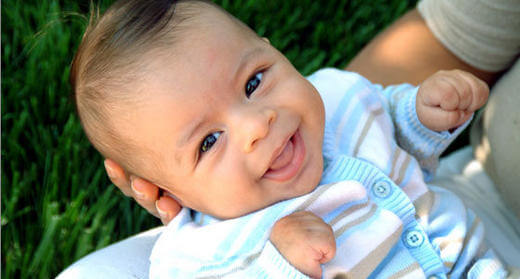5 Things You Should Never Do to Your Baby

You learned it the hard way without being able to avoid it. When a child is born, motherhood is not the only thing that follows. With it comes a waterfall of advice. It does not matter if you asked for it or not, or whether it even interests you, is appropriate or is simply a myth. However, there are a number of things you truly should never do to your baby.
Here are a few age-old tips that have stood the test of time. They are quite ingrained in virtually all grandmothers. Even with the best intentions of the world, certain popular suggestions, far from helpful, actually complicate motherhood. They also compromise the sacred bond between mother and child, among others.
No matter how much people say the opposite, always follow your instinct and the indications of health professionals. You will see that being a mother is a wonderful, beautiful and fulfilling experience. Complications, fears, doubts and tiredness will be only a memory when you feel the satisfaction of having given the very best of yourself.
That’s why, in this You Are Mom article, we will tell you the things you should not do to your baby. Take note that it’s best to disown the following tips. Of course, let go of everything that has not been advised by your trusted doctors.

What You Should Never Do to Your Baby
Of course, one is not born knowing how to be a good mother. It is a challenge. Context tends to create a bombardment of old wive’s tales. Yes, this can be truly overwhelming. So, my friend, with a smile on your face, take it all for what it is: opinions. And continue with your work, which you are perfectly able to do.
- “Do not spoil your child in your arms.” In fact, your body has always been your child’s best refuge. He spent nine months protected, warm and safe in your belly. Your arms are a continuity of that feeling in the outer world. That’s why, at least until the baby is 18 months, it is essential that your child feels affection. How is that achieved? Simply by skin-to-skin contact, which strengthens the bond between mother and child.
- Never ignore him. Babies do not cry out of anger or have the ability to be manipulative. Crying is his only way of communicating, and this varies according to his needs as they arise. The ignored newborn experiences great anguish that will be expressed in crying. It should be further emphasized that this is a small and defenseless human being, completely dependent on his parents.

- Never leave him alone. This is another thing you should simply never do to your baby at all. Many say that making this serious mistake is beneficial and teaches babies to be independent. However, the result of this practice is counterproductive. Under these conditions, the child ends up becoming a person without affection, with severe emotional scars. He is also likely to carry insecurity and low self-esteem throughout his life.
- Never hit your baby. Violence is never a solution or a method of teaching and discipline. Especially not with babies. As adults, we have an enormous responsibility to guide, protect and teach the child lovingly. Logically, we must never lose sight of the fact that this world is novel and surprising for children. Simply explain in a firm voice so he understands. The only thing violence teaches is obedience to fear.
- Dismiss the abundant myths pertaining to sleep. “Do not let him sleep in your arms, make him do it on his own” is repeated with fierce insistence. However, it is good to reassure babies before they go to sleep. Usually, when the little one wakes up, he feels unprotected. This motivates him to cry to express anguish and fear. So singing a lullaby, rocking your baby, and talking in a sweet and relaxed tone are the best choices. Another thing you should never do to your baby is let him cry until he falls asleep. This will not teach him how to handle his emotions. He will not develop a sense of trust in the world, in relationships and in himself.
You learned it the hard way without being able to avoid it. When a child is born, motherhood is not the only thing that follows. With it comes a waterfall of advice. It does not matter if you asked for it or not, or whether it even interests you, is appropriate or is simply a myth. However, there are a number of things you truly should never do to your baby.
Here are a few age-old tips that have stood the test of time. They are quite ingrained in virtually all grandmothers. Even with the best intentions of the world, certain popular suggestions, far from helpful, actually complicate motherhood. They also compromise the sacred bond between mother and child, among others.
No matter how much people say the opposite, always follow your instinct and the indications of health professionals. You will see that being a mother is a wonderful, beautiful and fulfilling experience. Complications, fears, doubts and tiredness will be only a memory when you feel the satisfaction of having given the very best of yourself.
That’s why, in this You Are Mom article, we will tell you the things you should not do to your baby. Take note that it’s best to disown the following tips. Of course, let go of everything that has not been advised by your trusted doctors.

What You Should Never Do to Your Baby
Of course, one is not born knowing how to be a good mother. It is a challenge. Context tends to create a bombardment of old wive’s tales. Yes, this can be truly overwhelming. So, my friend, with a smile on your face, take it all for what it is: opinions. And continue with your work, which you are perfectly able to do.
- “Do not spoil your child in your arms.” In fact, your body has always been your child’s best refuge. He spent nine months protected, warm and safe in your belly. Your arms are a continuity of that feeling in the outer world. That’s why, at least until the baby is 18 months, it is essential that your child feels affection. How is that achieved? Simply by skin-to-skin contact, which strengthens the bond between mother and child.
- Never ignore him. Babies do not cry out of anger or have the ability to be manipulative. Crying is his only way of communicating, and this varies according to his needs as they arise. The ignored newborn experiences great anguish that will be expressed in crying. It should be further emphasized that this is a small and defenseless human being, completely dependent on his parents.

- Never leave him alone. This is another thing you should simply never do to your baby at all. Many say that making this serious mistake is beneficial and teaches babies to be independent. However, the result of this practice is counterproductive. Under these conditions, the child ends up becoming a person without affection, with severe emotional scars. He is also likely to carry insecurity and low self-esteem throughout his life.
- Never hit your baby. Violence is never a solution or a method of teaching and discipline. Especially not with babies. As adults, we have an enormous responsibility to guide, protect and teach the child lovingly. Logically, we must never lose sight of the fact that this world is novel and surprising for children. Simply explain in a firm voice so he understands. The only thing violence teaches is obedience to fear.
- Dismiss the abundant myths pertaining to sleep. “Do not let him sleep in your arms, make him do it on his own” is repeated with fierce insistence. However, it is good to reassure babies before they go to sleep. Usually, when the little one wakes up, he feels unprotected. This motivates him to cry to express anguish and fear. So singing a lullaby, rocking your baby, and talking in a sweet and relaxed tone are the best choices. Another thing you should never do to your baby is let him cry until he falls asleep. This will not teach him how to handle his emotions. He will not develop a sense of trust in the world, in relationships and in himself.
All cited sources were thoroughly reviewed by our team to ensure their quality, reliability, currency, and validity. The bibliography of this article was considered reliable and of academic or scientific accuracy.
- Pérez Machado, J. L. (2010). Estudio comparativo de los efectos madurativos de estimular en decúbito prono una muestra de bebés normales (Doctoral dissertation). https://accedacris.ulpgc.es/bitstream/10553/4541/2/0613092_00000_0000.pdf
- Domínguez, T. N., & Guinea, S. F. (2008). Síndrome del bebé sacudido:¿ Es posible el diagnóstico diferencial?. Psicopatología Clínica Legal y Forense, 8(1), 107-128. https://dialnet.unirioja.es/servlet/articulo?codigo=3238788
- Cleveland Clinic medical professional. (2015). Colic: Causes, Symptoms, Diagnosis & Treatment. Cleveland Clinic. https://my.clevelandclinic.org/health/diseases/10823-colic
- Dawson, G., Ashman, S. B., & Carver, L. J. (2000). The role of early experience in shaping behavioral and brain development and its implications for social policy. Development and psychopathology, 12(4), 695-712. https://www.researchgate.net/publication/12129242_The_Role_of_Early_Experience_in_Shaping_Behavioral_and_Brain_Development_and_Its_Implications_for_Social_Policy
This text is provided for informational purposes only and does not replace consultation with a professional. If in doubt, consult your specialist.








